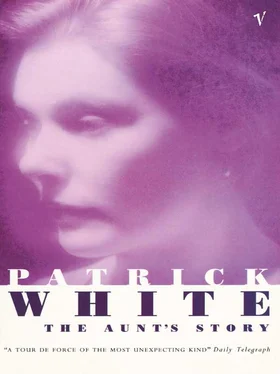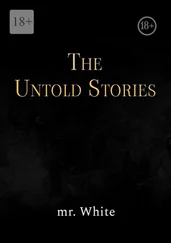It was Theo Goodman making an exhibition of herself, Mrs Dinwiddie said.
‘There,’ said Theodora, and her voice came down like two pieces of wood together. ‘We shall stop now, Frank,’ she said.
Although there was still music. Although he still stared out of his own surprise and the motion of what had been her body.
‘I shall go out into the cool,’ said Theodora.
Now he was following her like a bemused calf whom she had fed at intervals with skim milk and won to her in this way.
‘Just as you like, Theo,’ he said.
They went out into the silence of stars and sleeping animals. Her hand picked a leaf and smelled it. It was cold with dew.
‘Jove, Theo, you put me through my paces.’
She laughed. Winding out of the heights, she could not think what turn conversation might take. Whichever way, it hardly mattered.
‘These damn shoes of mine pinch,’ he said.
Because he had to make some motion to hold up the darkness that was pressing down. It was too big. When Frank Parrott was on the road, droving, or for some reason overtaken by darkness, he could not scrape together a few sticks quickly enough, to make a little fire, to sit against.
‘Your forget,’ he said. ‘It’s so long between dances you forget to buy a new pair of shoes. I remember at Singleton, in the autumn, there was a ball, an’ these damn shoes pinched so bad I took them off after supper and danced on my feet.’
Frank Parrott laughed. He laughed at the vision of himself. He had lit his little fire.
‘Hey,’ he said. ‘Where’ve you got to, Theo? What are you thinking about?’
‘Oh,’ she said, ‘I was thinking of how I used to go down to the creek, and take off my clothes, and float in the water like a stick. It’s good sometimes to be a stick.’
Of course she was mad, and you could never really forget it was Theo Goodman. Inside they were playing ‘Daisy Bell’. The music had come back.
‘We ought to go in,’ said Frank. ‘Mother’ll come out and tell us we’re wasting the music.’
And now, instead, she followed him along the meeker paths. She watched the shape of his back in the doorway. It was flat and black. After all, she said, it is true, it is mostly flat and black. Even though the music travelled into other worlds.
When it was all over Theodora Goodman touched Mrs Parrott’s kid glove and said it had been a lovely dance.
Yes, yawned Fanny against Father’s shoulder, on the way home. It had been the loveliest dance. And Theo, what did Theo think she was doing, almost throwing Frank Parrott off his feet?
But it was over and done with, the dance that Theodora had waited for and dreaded, the way you can sometimes grasp experience before it is undergone. There was the night, for instance, somewhere early in the summer, when she woke in bed and found that she was not beneath the tree. She had put out her hand to touch the face before the lightning struck, but not the tree. She was holding the faceless body that she had not yet recognized, and the lightning struck deep. Breaking her dream, the house was full of the breathing of people asleep and the pressure of furniture. She got up. It was hot in the passage. It was as suffocating as death. A stale cry came out of the mirror in the passage, choked, as if it just could not scream, even in its agony.
‘What is it, Theodora?’ Father asked, coming out of his room, which was close to the mirror.
‘Nothing, nothing, nothing,’ she almost cried.
She did not want to look at his face.
‘I was just dreaming,’ she said.
‘It’s broken now,’ Father said. ‘Go back to sleep.’
‘Yes,’ she said, ‘it’s broken.’
But this did not obliterate the dream. Although she could not see its shape, it continued to live its life in a state of vague misgiving in her mind.
‘And you?’ she said.
‘It’s thundery. I couldn’t sleep.’
‘Do you remember,’ she said, ‘it was my twelfth birthday, and I was thrown down when lightning struck the tree?’
‘I had forgotten,’ Father said.
‘And the man came. We gave him his dinner round at the side. He said he would come again, but he didn’t.’
‘I had forgotten all about that. Go back to sleep, Theodora.’
Father was going back into his room, and she wanted to stop him, because all the sadness of the world was in the house. There was the possibility that when the door closed, he would suffer the fate of the Man who was Given his Dinner, she might never see him again. But there are occasions on which you cannot stop the closing of the door. It closed. It closed on Father. She was alone in the passage. It would happen. It would be like this in time.
Summer closed in. It was hot and palpable, gathering in the passages, even under the trees, where the cows stood, sculptural in the evening, after they had been milked.
‘I saw that Tom Wilcocks who used to milk the cows,’ Fanny said, taking off her hat. ‘I wonder what happened to Pearl.’
But nobody knew what had happened to Pearl. She had left the district. She had gone to Sydney perhaps. And Fanny stuck the pins in her hat, and laughed, and reddened.
‘Tom Wilcocks waved to me,’ she said. ‘He was in that paddock across from Bloomfields’. He was lying in a patch of buttercups. He was wearing blue dungarees.’
‘And what did you do?’ asked Theodora through her pins, for she was fixing a hem on a petticoat.
‘Nothing, of course,’ Fanny said. ‘They say that Tom is no good. And you know what happened to Pearl.’
‘I liked him,’ said Theodora slowly. ‘I liked his hands.’
‘Really, Theodora!’ Fanny said.
She picked at her hair in the mirror. Theodora had made her quite red. Or the drive from town. It was hot. It was stifling already, at that time of year. That evening Mrs Goodman sat about and fanned herself with the leaf of a palm. You could hear the dry motion of the palm, which only accentuated heat, and dry, dry, like Mrs Goodman’s lips.
Only under the apricot tree it was cool, the old apricot tree at the back, which was now beyond the age for bearing, but which stood deep in grass and docks and still produced shade. Sometimes, and tonight, Theodora went and sat beneath the apricot tree. She took a book that she would not read. She marked her page with a dock and sat. And as she sat, there seemed to be no beginning or end. Meroã was eternity, and she was the keeper of it.
Before Mother broke in, ‘Theodora, Theodora, where is my little silver paper-knife?’
Mother’s voice made the hot air quiver.
‘What should I do with it?’ Theodora called back over her shoulder. ‘I haven’t seen your paper-knife.’
But Mother’s voice implied that she had. The little silver paper-knife still rapped knuckles playing a scale. Mother was afraid she was no longer Mother. It gave her indigestion, not to find a proof, as she sat and fanned herself with a palm on a hot evening at Meroã.
That night it was hotter, it was the hottest, the evening of the silver paper-knife. There were little insects in the air. And the moon was red. It hung in the branches of the apricot tree, big, and swollen red, close, you could almost touch its veins.
‘It must surely rain soon in this country,’ the voice of Mrs Goodman complained.
But it seemed unlikely. On hot evenings all the extremes of unlikelihood conspired, felt Theodora Goodman, and for that reason you waited, you waited for the red moon to crash like a thunderous gong through the leaves. The intermediate minutes were so many flying ants, their suggestion of motion, that the hand brushed the cheek.
Then the drum beat down across the flat. You heard the horse’s feet, beating the planks of the bridge. They beat deep, and more metallic, scattered and sauntered on the road, dropped and gathered, dropped and gathered, spurted as you heard the horse shy at a shadow. You could hear the fear protesting from his nose.
Читать дальше












